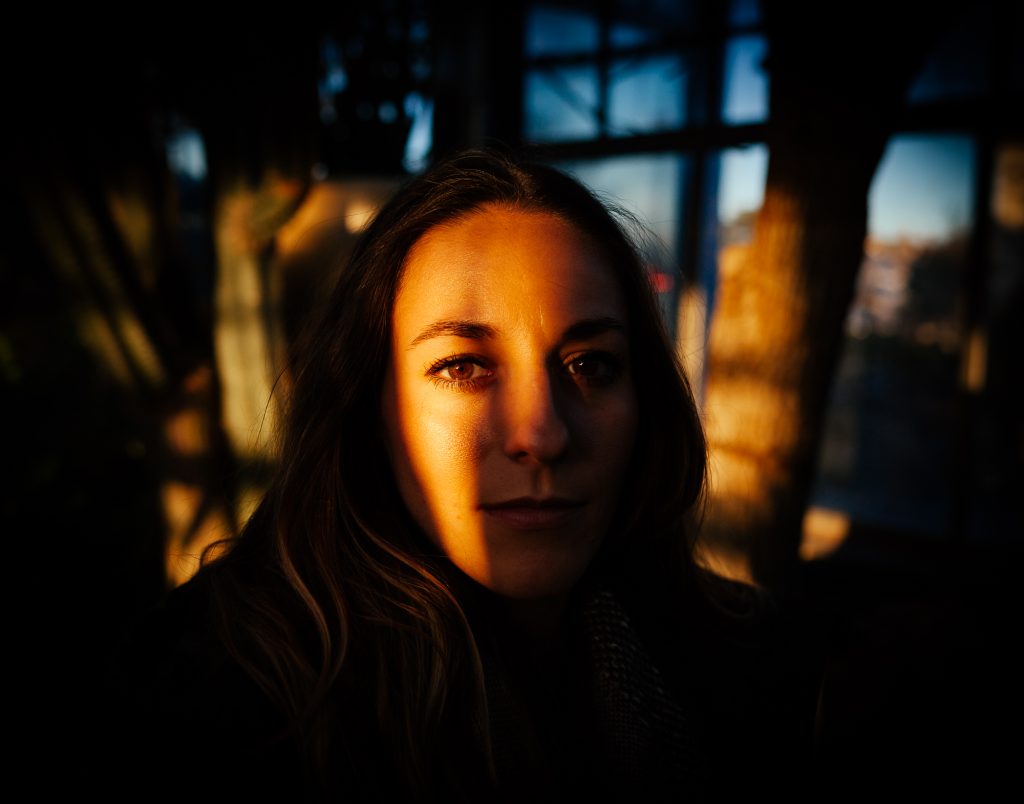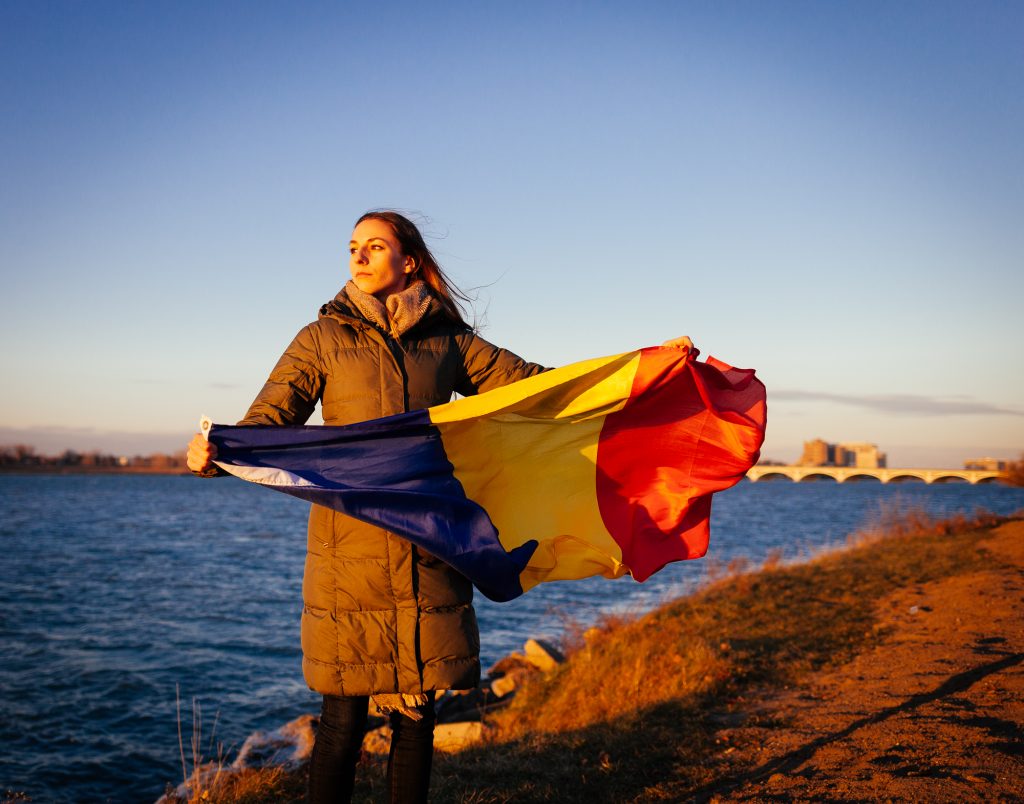
Romania
Vatra Dornei is a tourist town where people from all over Europe go skiing and enjoy winter. Asani was born there in 1990 – the same year communism in Romania ended. She grew up hearing her parents’ stories of waiting in line for bread and how their greatest joy had been listening to the radio. Asani considers her childhood “easy” as she never experienced the hardships her parents did. Her parents always made sure she and her brother went to school, no matter what.

“One winter the snow was so bad my mom couldn’t open the door. She had to dig a tunnel to get us out.” (audio below)

The Envelope
Asani’s mom was an agricultural engineer and professor and her dad was the only veterinarian in Vatra Dornei. They had a pretty good life there but they wanted a better future for their children and thought the US could provide that. Her dad had been dreaming about moving to America since high school. In 2000, when Asani was ten years old, her mom won the visa lottery. Asani remembers clearly the moment they found out the family was moving to America. The envelope arrived, her dad opened the letter, and her mom started crying. It was the culture back then for the mailman, also known as the “town drunk” to have a drink at every house where he delivered mail, so they were thankful the precious envelope even got to them!
“What we knew of America was it is this amazing country with the Golden Gate Bridge, and everyone there is rich!”
The family sold all their belongings and had lots of goodbye parties. At the time, Asani was too young to understand how life-changing this move would be.
“I didn’t realize what moving was and that I would be away from the rest of my family for the rest of my life.” (audio below)
Adjusting
The family moved from a comfortable lifestyle in Romania, where they were always having parties and socializing – to San Francisco, where they didn’t have money, friends, couldn’t speak the language, and their academic qualifications weren’t convertible. Both of Asani’s parents were always working two or three jobs.

For Asani, it was fun at first being in this new place, but they didn’t speak English. For the first three months, she and her brother stayed home with a “Romanian to English” dictionary, English language cartoons, and their parents’ encouragement. She remembers the massive playground down the street, which was exciting since they didn’t have one in Vatra Dornei. When Asani took an exam so the school could figure out which grade to place her in, they bumped her up a year. She never had a single ESL (English as a Second Language) class! She remembers the day she couldn’t recall a simple Romanian word.
“I couldn’t think of how to say ‘bread’ in Romanian. That was a shocking moment.”

Michigan
After one year of trying to make ends meet in California, the family decided to drive across the country to Michigan, which has the largest population of Romanians outside of Romania. They knew they had friends there and her parents were searching, trying to get the life back that they had in Romania. (audio below)

Life didn’t get much more comfortable when they moved to Michigan. Her parents worked at a factory making car parts, pressing buttons working seven days a week.
“Our parents would be gone. We would wake up by ourselves, make food for dinner, do our homework. They would come home at 10 pm. Sundays, they worked half days, and that was the only day we saw our parents. For a little while, my little brother and I had to raise ourselves.”

Identity
Asani’s legal name is Alexandra, but her older brother, who was a toddler at the time, called her “Asani” when they were heading home from the hospital. (audio below)
Asani picked up English fast and found herself regularly translating for her parents. She remembers moments when her parents didn’t understand something, and people would laugh at them. She came to believe that being Romanian wasn’t a good thing.
“I was embarrassed that I was from another country and didn’t want people to know. I didn’t want people to call me Asani, so I would tell them Alex is fine”.
Eventually, Asani became very proud to be from Romania.
“If you ask anyone from my dental school about me, the first thing they would say is ‘Asani is Romanian.’” (audio below)

Perfect Smiles
One of the first things Asani noticed about Americans was their perfect smiles.
“Everyone had straight teeth, no-gap, perfect smiles. I had a gap – a really big gap when I was a young girl. I thought all these American people would know I was different because of my gap.”
Asani remembers covering her face and trying to avoid talking to Americans. She would dream of one day having that “American smile,” and this led to her dream of being a dentist. Before moving to America, she always thought she would be a veterinarian like her father.
“Moving to America led me to the career I am choosing. I got into dental school, and I am fixing my smile. After going through what I went through, I don’t want people to be unhappy with their teeth.” (audio below)

Happiness
Her dad now works for the University of Michigan’s animal research center, and her mom works for the Engineering Library, maintaining the collection. Asani knows that her parents didn’t have the life they expected to have in the US. Asani’s dad seems to like the US more and more. After each visit back to Romania, he is happier he left. Asani feels like her mom can never feel happiness in America because her extended family is still in Romania. Her mother always said, “We are never truly happy unless we are in Romania.”
Asani thinks her mom feels guilt for any happy moments she has in America because her family isn’t here. The majority of the family in Romania live day-to-day, and her parents continually send remittances to Romania. Asani hopes one day the rest of the family can come to America too.
“Everything I do is so I can eventually bring my mom and dad happiness.” (audio below)
Asani wants to make sure that she repays her parents for all they have done for her. She knows how much they sacrificed for her and her brother to have a better future. Even now, when she visits home, her mom always tries to give her 20 dollars, since she knows Asani is living off of student loans. Asani promises her that when she is a dentist, she will pay her back.
“I can’t wait for the day when I have the money, and I can take my mom and all her sisters to Santorini or something and treat them all like goddesses.” (audio below)
Since moving to the US, Asani has moved 19 times and moved to the city of Detroit when she started dental school in 2015. Asani says a lot of people look down on Detroit, but to her it is home. She loves how new restaurants and murals are popping up all the time, and she’s never felt unsafe. She especially adores Belle Isle, where she runs regularly.
Future
If Asani has a child, she doesn’t want them to feel torn like she has – between America and Romania. She wants them to have a place they call home.
Every weekend growing up, Asani’s family would go hiking in the mountains. Like her and her ancestors, when Asani has children, she needs them to have this experience, to know nature and the mountains. (audio below)
Michigan doesn’t have mountains, but when she visited Washington State, it felt more like Romania. Maybe someday Asani will move out west.
*Update: Since the interview, Asani has moved to North Carolina, where she is practicing as a dentist. Asani is also going to be getting married soon to the love of her life, with one ceremony in Vatra Dornei and one in the United States.
#FINDINGAMERICAN
To receive updates on the book release and exhibition of “Finding American: Stories of Immigration from all 50 States” please subscribe here. This project is a labor of love and passion. If you would like to support its continuation, it would be greatly appreciated!
© Photos and text by Colin Boyd Shafer | Edited by Kate Kamo McHugh. Quotes edited for clarity and brevity.


